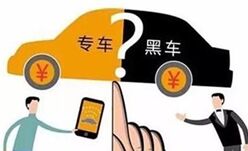中国网约车获得合法地位
The country's first nationwide regulations for on-demand mobility (ODM) services was unveiled Thursday.
It formally granted legal status to companies like Didi Chuxing and Uber that had operated in a gray area in China.
Vice Minister of Transport Liu Xiaoming
"It grants legal status to on-demand mobility services, clarifies the role and responsibility of service providers, sets out requirements for their operation and aims to promote sound and innovative development of the industry."

The latest document specifies that firms like Didi Chuxing and Uber do not need to own their fleet, effectively allowing private cars to join the party.
Vehicles and drivers need to apply for a license collectively before starting services.
Companies in the sector are responsible for the qualification of their fleet and drivers.
A provisional rule released by the Ministry of Transport on the same day set out detailed requirements for ODM companies and drivers.
One item in it limits the operational life of private vehicles used for offering rides.
"Traditional taxi cars are banned from the road after eight years in service. But those used for ODM services are different. They are no longer allowed to offer rides after they clock-up 600,000 km or have been in use for eight years, but they can still hit roads for private purposes if they don't run that distance within eight years."
At the same time, the rule also stipulates ODM drivers must have no criminal record for driving offences, drugs, alcohol or violent crimes.
Liu Zhao with the Traffic Management Bureau of the Public Security Ministry.
"On-demand mobility services are convenient, but also have some safety risks due to the difficulty in monitoring the drivers. The requirements set out in the rules aim to ensure safe and reliable services."
The rules also require ODM companies to pay taxes and buy insurance for passengers, while banning them undercutting market prices, which could disrupt market order.
Meanwhile, it also addresses the concerns of tradition cab drivers who have complained about tougher business conditions resulting from the soaring popularity of Didi Chuxing and Uber.
Taxi companies are now urged to reduce high franchise fees and encouraged to provide online-booking services or merge with ODM companies.
Official figures show close to 97 million Chinese, or about one in every 14, hailed a taxi via online ODM services in 2015, while close to 22 million people booked private cars online.
There are close to 1.4 million taxis across China, carrying more than 100 million people per day on average.
The new policy has been hailed by transportation experts.
Chen Yanyan with Beijing University of Technology.
"For passengers, it guarantees their safety and interests. For traditional taxi operators, it provides a fair market environment and encourages them to improve. And for the industry itself, it ensures healthy development under strict supervision."
ODM companies including Didi Chuxing and Uber, as well as traditional taxi operators, also voice support for the policy.
For CRI, this is Liu Mohan.
- 上一篇

- 下一篇



 手机网站
手机网站